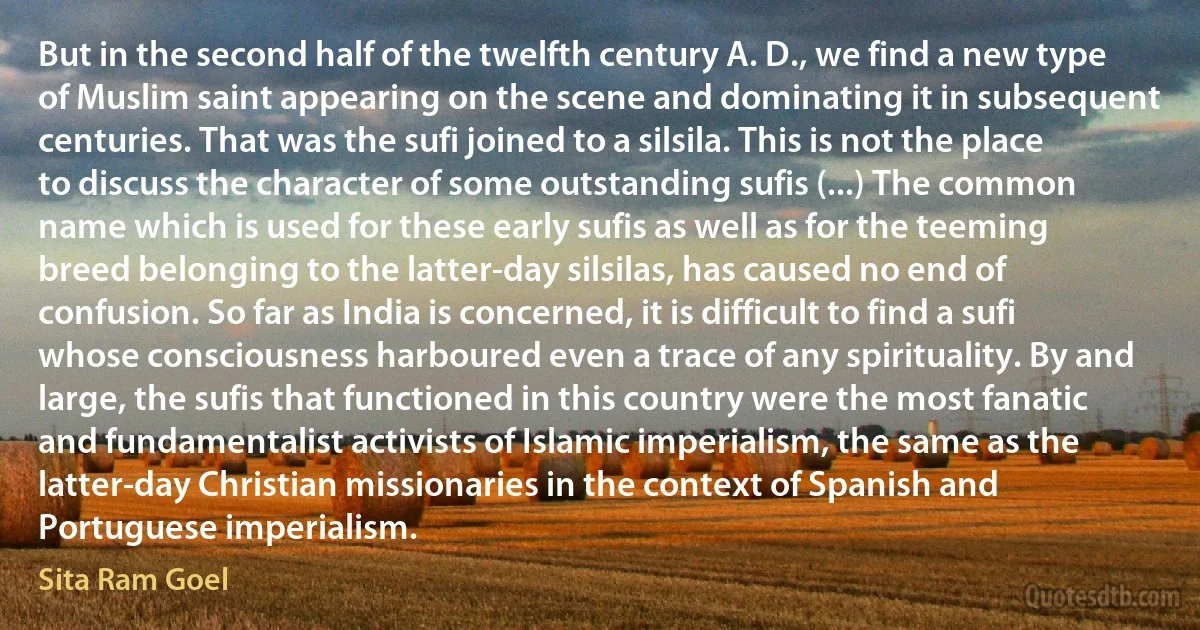
But in the second half of the twelfth century A. D., we find a new type of Muslim saint appearing on the scene and dominating it in subsequent centuries. That was the sufi joined to a silsila. This is not the place to discuss the character of some outstanding sufis (...) The common name which is used for these early sufis as well as for the teeming breed belonging to the latter-day silsilas, has caused no end of confusion. So far as India is concerned, it is difficult to find a sufi whose consciousness harboured even a trace of any spirituality. By and large, the sufis that functioned in this country were the most fanatic and fundamentalist activists of Islamic imperialism, the same as the latter-day Christian missionaries in the context of Spanish and Portuguese imperialism.
Sita Ram GoelRelated topics
breed century character christian common context country early end fanatic far find half imperialism large name place saint scene second spirituality subsequent sufi twelfth well fundamentalist islamicRelated quotes
Don't forget that God sees you and watches you when you are in pain; He perceives even the beating of your heart. Consequently, He will not leave you without consolation and His fatherly protection. Naturally, the saints rejoiced in their afflictions; as for us, let us at least manage to accept affliction or pain patiently.
My child, pray within your heart, and the name of Jesus will become for you a comforting balm so that you can bear this trial of yours in a way which benefits you. You will greatly benefit from this trial if you submit yourself to it patiently. So again I say to you, with the almighty armor of prayer continually approach the omnipotent Lord more often, and you will come to know how He wondrously lifts the burden of pain and marvellously gives rest to sufferers.

Ephraim of Arizona
Towards the end of the twelfth century, while Western Europe was still wavering between a dying Roman influence and a dawning Gothicism, preliminaries to a medieval era which would make possible the development of a world-wide humanism, Asia had already lived through her classical period and, sinking into decay, was preparing to face a long period of political and spiritual unrest. While India was beginning to suffer under the yoke of the victorious Mussulman, who had come down on her from the mountains of Afghanistan and the plains of Iran, and while the domination of the Khmers was reaching its climax at Angkor, China, under pressure from the barbarians of the north, was withdrawing to the south where the Song empire, thinking itself safe from invasions, continued to live a life of luxury.

Louis Frédéric
Man is gifted with pity and other kindly feelings; he has also the power of preventing many kinds of suffering. I conceive it to fall well within his province to replace Natural Selection by other processes that are more merciful and not less effective.This is precisely the aim of Eugenics. Its first object is to check the birth-rate of the Unfit, instead of allowing them to come into being, though doomed in large numbers to perish prematurely. The second object is the improvement of the race by furthering the productivity of the Fit by early marriages and healthful rearing of their children. Natural Selection rests upon excessive production and wholesale destruction; Eugenics on bringing no more individuals into the world than can be properly cared for, and those only of the best stock.

Francis Galton
The notion of the "axis of evil" has an interesting provenance. In early drafts of the President's speech the "axis of evil" was the "axis of hatred", "axis" having been settled on for its associations with the enemy in the second world war. The "axis of hatred" at this point consisted of only two countries, Iran and Iraq. whereas of course the original axis consisted of three (Germany, Italy, Japan). It was additionally noticed that Iran and Iraq, while not both Arab, were both Muslim. So they brought in North Korea.
We may notice, in this embarras of the inapposite, that the Axis was an alliance, whereas Iran and Iraq are blood-bespattered enemies, and the zombie nation of North Korea is, in truth, so mortally ashamed of itself that it can hardly bear to show its face.

Martin Amis
You can lose yourself or disappear in a big city. You can even change your identity and live a new life. You can indulge in a very long investigation to find a trace of malice, starting only with one or two addresses in an isolated neighbourhood. I have always been fascinated by the short note that sometimes appears on search records: Last known address. Themes of disappearance, identity and the passing of time are closely bound up with the topography of cities. That is why since the 19th century, cities have been the territory of novelists, and some of the greatest of them are linked to a single city: Balzac and Paris, Dickens and London, Dostoyevsky and Saint Petersburg, Tokyo and Nagai Kafū, Stockholm and Hjalmar Söderberg.

Patrick Modiano
